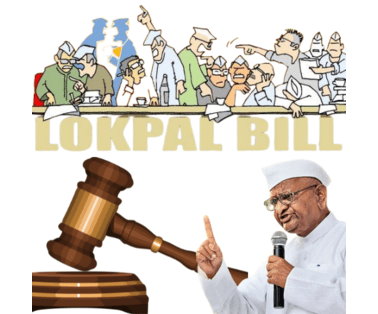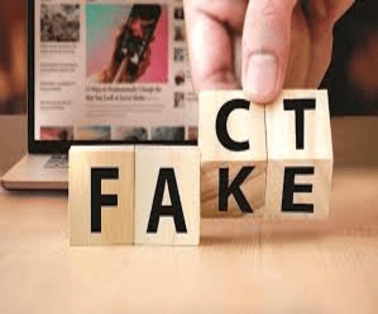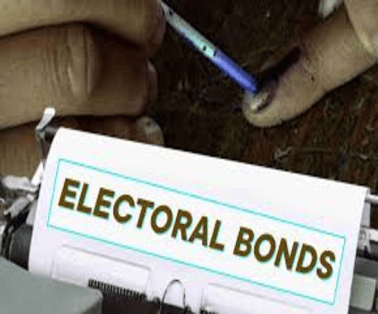Recently, a new logo and a new motto were launched for Lokpal, the apex anti-corruption ombudsman. Former Supreme Court judge Justice Pinaki Chandra Ghose was finalised by a selection panel as the first head of the Lokpal.
The first head has been selected 5 years after the President had given assent to the Lokpal and Lokayukta Act, 2013
Key Points On Lokpal and Lokayukta
Logo
- It includes the shapes of the ombudsman (Judges’ Bench), the people (three human figures), vigilance (an Ashoka Chakra forming an eye), the law (a shape of book) and the judicial (two tri-colour hands placed below, forming a unique balance).
- It is designed by Prashant Mishra, a resident of Prayagraj, U.P.
Motto
- “Ma Gridhah Kasyasvidhanam (Do not be greedy for anyone’s wealth)”.
- Lokpal has decided its motto/slogan based on their own inputs and discussions.
Lokpal And Lokayukta
- The Lokpal and Lokayukta Act, 2013 provided for the establishment of Lokpal for the Union and Lokayukta for States.
- These institutions are statutory bodies without any constitutional status.
- They perform the function of an “ombudsman” and inquire into allegations of corruption against certain public functionaries and for related matters.
- In India, the concept of constitutional ombudsman was first proposed by the then law minister Ashok Kumar Sen in parliament in the early 1960s.
- The term Lokpal and Lokayukta were coined by Dr L. M. Singhvi.
- The Bill was passed in 2013 in both the Houses of Parliament and came into force on 16 January 2014.
Background Of Lokpal and Lokayukta
- In 1809, the institution of ombudsman was inaugurated officially in Sweden.
- In the 20th century, Ombudsman as an institution developed and grew most significantly after the Second World War.
- New Zealand and Norway adopted this system in the year 1962and it proved to be of great significance in spreading the concept of the ombudsman.
- In 1967, on the recommendations of the Whyatt Report of 1961, Great Britain adopted the institution of the ombudsman and became the first large nation in the democratic world to have such a system.
- In 1966, Guyana became the first developing nation to adopt the concept of the ombudsman. Subsequently, it was further adopted by Mauritius, Singapore, Malaysia, and India as well.
- In 1966, the First Administrative Reforms Commission recommended the setting up of two independent authorities-at the central and state level, to look into complaints against public functionaries, including MPs.
- In 1968, Lokpal bill was passed in Lok Sabha but lapsed with the dissolution of Lok Sabha and since then it has lapsed in the Lok Sabha many times.
- Till 2011 eight attempts were made to pass the Bill, but all met with failure.
- In 2002, the Commission to Review the Working of the Constitution headed by M.N. Venkatachaliah recommended the appointment of the Lokpal and Lokayuktas; also recommended that the PM be kept out of the ambit of the authority.
- In 2005, the Second Administrative Reforms Commission chaired by Veerappa Moily recommended that the office of Lokpal should be established without delay.
- In 2011, the government formed a Group of Ministers, chaired by Pranab Mukherjee to suggest measures to tackle corruption and examine the proposal of a Lokpal Bill.
- “India Against Corruption movement” led by Anna Hazare put pressure on the United Progressive Alliance (UPA) government at the Centre and resulted in the passing of the Lokpal and Lokayuktas Bill, 2013, in both the Houses of Parliament.
Highlights Of The Lokpal and Lokayukta Act Of 2013:
- Composition: The Lokpal will consist of a chairperson and a maximum of eight members.
- Applicability: The Lokpal will cover all categories of public servants, including the Prime Minister. But the armed forces do not come under the ambit of Lokpal.
- The Act also incorporates provisions for attachment and confiscation of property acquired by corrupt means, even while the prosecution is pending.
- The States will have to institute Lokayukta within one year of the commencement of the Act.
- The Act also ensures that public servants who act as whistleblowers are protected.
Who Can Become The Chairperson Of the Lokpal and Lokayukta?
The person who is to be appointed as the chairperson of the Lokpal should be either of the following: Either the former Chief Justice of India Or the former Judge of Supreme Court Or an eminent person with impeccable integrity and outstanding ability, having special knowledge and expertise of minimum 25 years in the matters relating to anti-corruption policy, public administration, vigilance, finance including insurance and banking, law and management.
Who Can Become A Member Of Lokpal and Lokayukta?
Out of the maximum eight members, half will be judicial members. Minimum fifty per cent of the Members will be from SC / ST / OBC / Minorities and women. The judicial member of the Lokpal should be either a former Judge of the Supreme Court or a former Chief Justice of a High Court. The non-judicial member should be an eminent person with impeccable integrity and outstanding ability, having special knowledge and expertise of minimum 25 years in the matters relating to anti-corruption policy, public administration, vigilance, finance including insurance and banking, law and management.
Who Cannot Become The Chairperson Of Lokpal and Lokayukta?
The following persons cannot become chairperson of Lokpal: MPs and MLAs Persons convicted of any offense involving moral turpitude Less than 45 years of age, Members of Panchayats or Municipality, A person who was removed or dismissed from the public service, A person who holds any office of trust / profit; if so, he would need to resign from Lokpal. A person who is affiliated to a political party Carries on some business / profession; if so, he would need to quit some business.
Powers of Lokpal
- It has powers to superintendence over, and to give direction to CBI.
- If it has referred a case to CBI, the investigating officer in such case cannot be transferred without approval of Lokpal.
- Powers to authorize CBI for search and seizure operations connected to such case.
- The Inquiry Wing of the Lokpal has been vested with the powers of a civil court.
- Lokpal has powers of confiscation of assets, proceeds, receipts and benefits arisen or procured by means of corruption in special circumstances
- Lokpal has powers to recommend transfer or suspension of public servant connected with allegation of corruption.
- Lokpal has power to give directions to prevent destruction of records during preliminary inquiry.
Functioning Of Lokpal and Lokayukta
- A complaint can be made to the Lokpal for an offence under the Prevention of Corruption Act.
- The Lokpal may order a preliminary inquiry by its Inquiry Wing or refer it any investigation agency like CBI. However, the Lokpal should establish that a prima facie case exists after seeking an explanation from the public servant as well as his competent authority.
- With respect to Central Government Servants, it may refer cases to the Central Vigilance Commission.
- Preliminary Enquiry report should be done within 60 days.
- A Lokpal bench of not less than 3 members considers it and after giving an opportunity to the public servant, decides on a further investigation – it may dismiss, initiate a full investigation or start departmental proceedings.
- The preliminary investigation should be normally completed within 90 days.
- The trials will be held in special courts, which must complete them within one year.
- Extensions can be made but the total period cannot exceed two years.
Terms of Office Of Lokpal and Lokayukta
- Upon selection, the chairperson and members shall hold office for a term of five years or till they attain 70 years of age.
- The salary and allowances of the chairman of the Lokpal will be same as that of the Chief Justice of India, and that of members will be same as that of a judge of Supreme Court.
- The chief and members of the Lokpal are not eligible for reappointments.
- They will also not be eligible for any diplomatic assignment, appointment as administrator of a Union territory and for further employment to any other office of profit under the government of India.
The Lokpal And Lokayukta (Amendment) Act, 2016
The bill seeks to amend the Lokpal and Lokayukta Act, 2013 which provides Lokpal (at Centre) and Lokayukta (at States) statutory backing to inquire into allegations of corruption against certain public functionaries and for related matters
Key Provisions:
- Enable the leader of the single largest opposition party in the Lok Sabha in the absence of a recognised Leader of Opposition to be a member of the selection committee that would select the ombudsman.
- Amends section 44 of parent Act that deals with provision of furnishing of details of assets and liabilities of public servants within 30 days of joining the government service. The amendment has removed the period of 30 days. Now the public servants will make declaration of their assets and liabilities in the form and manner as prescribed by government.
- Gives more time to public servants and trustees and board members of Non-Governmental Organisations (NGOs) to declare their assets and those of their spouses.
Who Can Be Investigated By The Lokpal?
As per the provision of the Lokpal Act, it can investigate persons of seven categories namely;
- Prime Minister if he/she demits the office.
- Current and former Cabinet Ministers.
- Current and former Members of Parliament.
- All the class 1 officers of the Central Government like (Secretaries, Joint Secretaries etc.)
- All the class 1 equivalent officers of the Public Sector Undertakings and other government bodies.
- Directors and other officers of the Non Government Organisations which receives funding from the Central Government.
- Directors and other officers of the Non Government Organisations which receives the fund from the public and which have annual income of more than Rs. 10 lac from a foreign contributor and receives Rs. 1 cr from the government.
How Can Lokpal Be Removed?
To remove the Lokpal 100 members of the Parliament need to sign the petition seeking the removal of the chairman of the Lokpal or any other members. This matter will be investigated by the Supreme Court and if SC finds the charges to be true then SC suggests the president to remove the Lokpal from the post.
Another way to remove the Lokpal is self reference of the President (on the advice of the cabinet) to the Supreme Court, which can investigate the charges
Jurisdiction of Lokpal
The following come under the jurisdiction of Lokpal:
- Prime Minister of India, under certain conditions as stipulated in the adjacent box.
- All ministers of the Union
- Members of Parliament except for matters related to article 105 of constitution. (that is anything said or a vote given by him in Parliament)
- Group ‘A’ or Group ‘B’ officers
- Group ‘C’ or Group ‘D’ officials
- Any person who is or has been in-charge (director / manager/ secretary) of anybody / society set up by central act or any other body financed / controlled by central government.
- Any other person involved in act of abetting, bribe giving or bribe taking
Lokpal Benches
A Lokpal Bench will be constituted by the Chairperson with two or more members. Every Lokpal Bench has to have at least half members as judicial members. If bench consists of Chairperson, it will be headed by him. If the bench does not consist of chairperson, it will be headed by a judicial member only. The Lokpal benches will sit in New Delhi or any other places as decided by Lokpal. The benches can be constituted and reconstituted by Chairperson time to time.
What Is Not There In Our Lokpal Act?
The Lokpal and Lokayuktas Act is perhaps the only legislation in the history of independent India, which has been so widely discussed, both inside and outside Parliament and has, thus generated so much awareness in the public mind about the need to have an effective institution of Lokpal to tackle corruption. However, the act passed hitherto is verbose, full of negatives and has numerous cross references. Still, here are a few things which are absent from this law:
- No protection to whistleblowers: This was one of the main demands in the Janlokpal Bill. The recently passed act has not at all provisions for whistleblower protection. We have to have a separate law for that.
- There is only one section on Lokayukta in the act which says that within one year, the states shall enact the Lokayukta act. However, there is nothing regarding their composition, powers etc. In fact, states are free to define how their own Lokayuktas would be appointed, how they would work and under what circumstances they would serve.
- The Lokpal act brings the PM under its jurisdiction, yet the Judiciary has been left. Judiciary is NOT subject to Lokpal jurisdiction.
- The provisions of the act have become anomalous because of Lokpal’s relations with the CBI. Under the provisions of the act, Lokpal has been vested with all powers related to only tose cases which it refers to CBI. Instead, there was a long demand that CBI should be merged with Lokpal. The current provisions are open to misuse.
- There are no provisions related to Citizen’s charter.
- There are no adequate provisions to appeal against the Lokpal. Lokpal cannot conduct inquiry against itself.
Lokpal (Complaint) Rules, 2020
- Complaint can be filed with the Lokpal against the sitting Prime Minister, Union Ministers, MPs, bureaucrats, among others.
- A complaint filed against a sitting or former prime minister shall be decided by full bench of Lokpal comprising of its Chairman and all members in admission stage.
- If such complaint is dismissed by the full bench, records of enquiry are not to be published.
- A complaint against Union Minister/ MP is to be looked into by bench of not less than three members.
Rules for filing complaints:
- According to the rules, the complainant has to give a valid proof of identity, as specified therein.
- Foreign nationals can also lodge complaints and they require only a copy of their passports as proof of identity.
- The complaint can be filed electronically, by post or in person.
- In case the complaint is filed electronically, its hard copy has to be submitted to the Lokpal within 15 days.
- No complaints can be filed against a public servant under the Army Act, Navy Act, Air Force Act and the Coast Guard Act.
- A complaint may ordinarily be made in English, provided that the Lokpal may also entertain a complaint in any of the languages referred to in the Eighth Schedule to the Constitution.
- Apart from the details of the accused official(s), allegation and the evidence relied upon, the complainant or the authorized signatory will also have to mandatorily submit an affidavit on non-judicial stamp paper.
- Registration/incorporation certificate of the organisation, on whose behalf the complaint is made and copy of authorization certificate in favour of the signatory, if the complaint is on behalf of a board, body, corporation, company, limited liability partnership, authority, society, association of persons or trusts, has to be furnished.
Handling complaints:
- The Lokpal bench will decide the complaint in the first instance at the admission stage. The Lokpal may seek other details or affidavit, if necessary.
- The identity of the complainant or the accused official will be protected by the Lokpal till the conclusion of inquiry or investigation.
- However, the protection will not be applicable in cases where the complainant herself reveals her identity to any other office or authority while making the complaint to Lokpal.
- The complaints, whose contents are illegible, vague or ambiguous, contents of the complaint are trivial or frivolous; or do not contain any allegation, are not filed within the limitation period of seven years, or are pending before any other court, tribunal or authority, will have to be disposed of within 30 days.
- Any false, frivolous complaint is punishable with imprisonment for the term up to one year and a fine up to 1 lakh rupees.
Disposition of Complaints:
- The Lokpal can send complaint to the enquiry wing of the Lokpal which may than order a preliminary inquiry.
- If a prime facie case is found, the Lokpal can refer the complaint for an investigation by a probe agency like CBI.
- The investigation must be completed within 6 months and the trail must be finished within a maximum duration of 2 years.
Members Of Lokpal and Lokayukta
Upon the recommendation of the Selection Committee under section 4(1) of the Lokpal and Lokayuktas Act, 2013, the President of India appointed the Chairperson and eight Members (including four judicial Members) by warrant under his hand and seal on 19th March, 2019. Chairperson and Members have assumed charge of their respective positions respectively on 23rd March, 2019 and 27th March, 2019. Details of Chairperson and Members of Lokpal are given be
|
Name |
Position |
|
|
1. |
Shri Justice Pinaki Chandra Ghose |
Chairperson |
|
2. |
Shri Justice Dilip Babasaheb Bhosale |
Member(Judicial) |
|
3. |
Shri Justice Pardip Kumar Mohanty |
Member(Judicial) |
|
4. |
Smt. Justice Abhilasha Kumari |
Member(Judicial) |
|
5. |
Shri Justice Ajay Kumar Tripathi |
Member(Judicial) |
|
6. |
Shri Dinesh Kumar Jain |
Member |
|
7. |
Smt. Archana Ramasundaram |
Member |
|
8. |
Shri Mahender Singh |
Member |
|
9. |
Dr. Indrajeet Prasad Gautam |
Member |
Punjab
The Punjab Cabinet approved the new Lokayukta Bill which will bring all public functionaries including the Chief Minister in its ambit. The Bill will be introduced for passage in the ongoing session of the state Assembly.
Punjab Lokayukta Bill, 2020, seeks to replace Punjab Lokpal Act, 1996, and the new legislation will be applicable to the Chief Minister, ministers, non-officials/officials of all the public offices, with the aim of further enhancing governance and checking corruption, a government statement said. A stronger anti-corruption ombudsman was the pre-poll promise of the Congress government. The Bill was drafted months ago, but debate over the inclusion of CM and ministers delayed it.
Which Countries Of The World Have Lokpal?
These countries of the world also have the office of anti corruption officers which is similar to Lokpal ombudsman of India.
- United Kingdom
- Spain
- Burkina Faso
- Netherland
- Austria
- Portugal
- Finland
- Denmark
- Sweden
To Download Monthly Current Affairs PDF Click here
Click here to get a free demo
Everything About CLAT 2025
Frequently Asked Questions
Who was finalised by a selection panel as the first head of the Lokpal?
Justice Pinaki Chandra Ghose was the first head of the Lokpal.
Ma Gridhah Kasyasvidhanam is the motto of Lokpal.
The term Lokpal and Lokayukta were coined by?
Dr L. M. Singhvi coined the term Lokpal and Lokayukta.
In 1809, the institution of ombudsman was inaugurated officially in?
In 1809, the institution of ombudsman was inaugurated officially in Sweden.
. Which state recently approved the new Lokayukta Bill?
Punjab recently approved the new Lokayukta Bill



